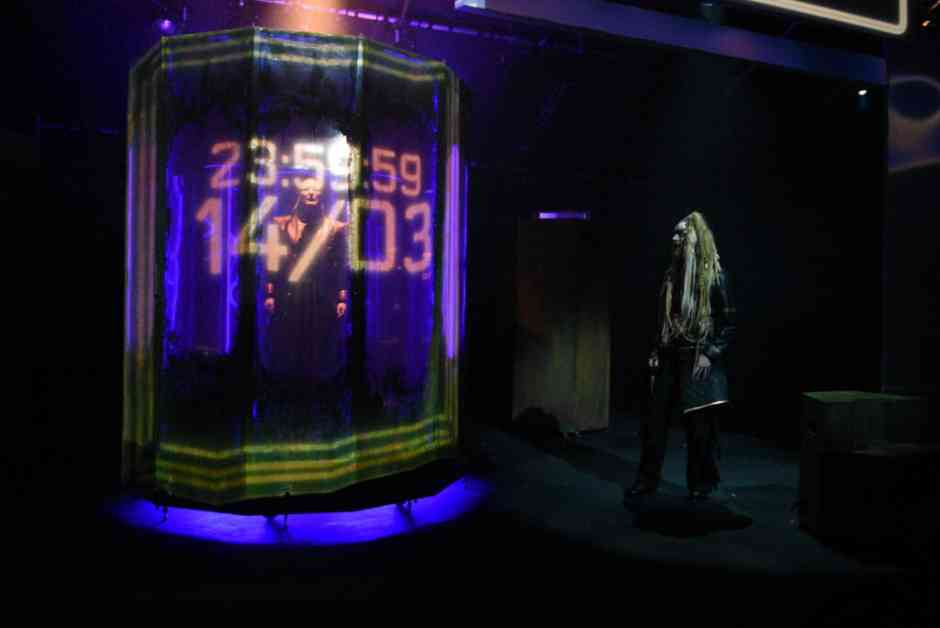Modern Twist on a Classic Tale
The recent production of Julius Caesar at Southwark Playhouse offered a bold and futuristic take on Shakespeare’s tragic story, appealing to a younger audience who may be more familiar with modern technology and storytelling techniques. Directed by Max Lewedel and presented by the Icarus Theatre Collective, the play transported viewers to a Neo-Rome set in a futuristic version of the UK. The innovative use of Creative Captioning, developed with the support of Arts Council England, aimed to make the play more accessible and inclusive to all audiences, especially those who may find Shakespearean language daunting.
As the audience settled in for the show, they were greeted with a visually striking production that combined elements of Hunger Games and Mad Max, with leather-clad actors engaging in a lively feast of Lupercalia. The use of screens flashing messages and neon text captions added a modern twist to the traditional Shakespearean dialogue, creating a dynamic and engaging experience for viewers. While initially disorienting, the integration of projected animations alongside the text helped to illustrate the storytelling and enhance the overall theatrical experience.
Relevance in Today’s World
The timing of the production could not have been more apt, given the recent political turmoil and rise of autocratic regimes around the world. Themes of ambition, betrayal, and the manipulation of public opinion resonated strongly with contemporary events, from the storming of the Capitol to the manipulation of social media for political gain. The play’s exploration of fake news and political intrigue served as a timely reminder of the dangers of unchecked power and the importance of upholding democratic values.
One of the standout scenes in the play was the portrayal of Caesar’s assassination on the Ides of March, where the character was represented as a hologram. While this modern interpretation may have felt sanitized to some, it underscored the play’s exploration of the blurring lines between reality and illusion in the age of digital manipulation. The performance of Mark Anthony, played with manipulative charm, highlighted the power of persuasive rhetoric and the ease with which public opinion can be swayed by charismatic leaders.
Embracing Technology for a New Generation
Despite some reservations about the use of technology in the production, both critics agreed that the innovative approach taken by the Icarus Theatre Collective was commendable. By incorporating new technologies and creative storytelling techniques, the production succeeded in bringing Shakespeare into the 21st century and engaging a younger, screen-savvy audience. The incorporation of British Sign Language in future productions further demonstrated the collective’s commitment to accessibility and inclusivity in the arts.
The cast and projection designer Will Monks deserve praise for their ability to keep pace with the technological elements of the production, seamlessly integrating screens and animations into the performance. While the use of holograms and digital effects may have felt jarring at times, they ultimately served to enhance the storytelling and create a visually captivating experience for viewers. As Frida Gray aptly put it, “The fault, dear Brutus, is not in our stars, but in ourselves,” highlighting the timeless relevance of Shakespeare’s themes to contemporary society.
In conclusion, the production of Julius Caesar at Southwark Playhouse offered a fresh and modern interpretation of a classic Shakespearean tale, blending traditional language with innovative technology to create a dynamic and engaging theatrical experience. By pushing the boundaries of storytelling and embracing new technologies, the Icarus Theatre Collective succeeded in bringing Shakespeare to a new generation of audiences and sparking important conversations about power, ambition, and the nature of democracy. As Caesar himself once said, “Men willingly believe what they wish,” reminding us of the enduring power of storytelling to shape our understanding of the world around us.












